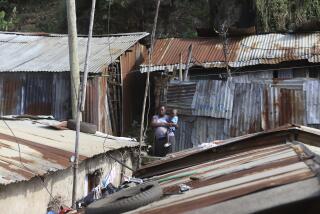AFRICA : Leaders Fiddle as Kenya Burns, Critics Charge
- Share via
NAIROBI, Kenya — A few weeks ago, questions about Kenya’s future swept the nation on a whirlwind of rumors: President Daniel Arap Moi had fallen from sight and was said to be ill.
Soon, the 70-year-old president reappeared, looking robust. But the same cannot be said of Kenya after 17 years of Moi’s presidency.
With Kenya’s infrastructure crumbling, crime rampant, corruption entrenched and ethnic disturbances continuing, the Moi administration seems to be responding according to the worst of stereotypes: building grand edifices to itself, cracking down on dissent and trying to divert public attention with questionable “threats” from elsewhere.
In lesser countries, such ungainly policies might pass without notice. But Kenya is a cornerstone of hopes for the revitalization of the African continent. For many thousands of visitors, it is Africa’s ambassador to the world, and the international media use Nairobi as their continental headquarters.
Many here take heart that the economy still appears stable. Inflation is down, trade is up, and the Kenyan shilling is strong. Good rain and rising commodity prices promise 3% economic growth. And the “donor” nations seem to be saying that’s good enough for now.
The International Monetary Fund has pledged $200 million to assist Kenya during the next two years, and the United States is providing about $20 million more.
But many Kenyans find themselves asking whether they should expect more of their government.
Why should the Moi government proceed with a $90-million airport in the far-off reaches of the president’s home region of Eldoret when Nairobi’s airport, the hub for Kenya’s essential tourist business, is deteriorating and managers call it a safety hazard?
Why should citizens suffer the spread of frightful crime and ethnic clashes while the government works overtime to draw their attention to dubious threats of refugee rebel forces outside its borders--threats that opposition politicians and Western diplomats say are simply diversionary?
Two years after yielding to international demands that it open Kenyan politics to opposition parties, why is Moi’s Kenya African National Union once again stepping up arrests of opposition politicians who organize rallies or criticize Moi?
*
Last month, authorities detained U.S. Ambassador Aurelia Brazeal, apparently on the suspicion that she was en route to meet opposition leaders. Brazeal said she was going to a friend’s house for dinner. She was released after an hour.
“It’s very worrisome. In fact, it’s outrageous that opposition parliamentarians are being jailed,” one Western diplomat said. “We’re hoping that it’s just a rough spot and Kenya will revert to the more stable political climate of just a few months ago.”
Most indications, however, are to the contrary.
Just this week, six opposition members of Parliament were arrested for trying to address a public rally. Private organizations that have meddled with the status quo have been closed and firebombed. On Thursday, Moi’s ruling KANU party demanded the expulsion of American correspondents for Newsweek and Time for writing unfavorable stories.
In the countryside, the political friction fans deadly ethnic rivalries--and critics say the government is stirring up the trouble.
In a recent human rights report, the U.S. State Department said, “High-level government officials were complicit in instigating and promoting the ethnic clashes, which had as of year’s end claimed over 1,000 lives and displaced 250,000 people.”
Despite hopes for sustained economic growth, the country’s roads, utilities and police seem overwhelmed by population increases and sheer neglect. Some major highways are often impassable and always deadly, Nairobi is rationing electrical power, Mombasa is straining under water shortages, and violent crime makes this one of the world’s most dangerous destinations--hardly a foundation for long-term prosperity.
Already the combined consequences have added up to a 30% slide in Kenya’s tourism. And the United Nations, which maintains a large mission here, says it is worried about the safety of its employees.
Widespread corruption is sapping the nation of resources and, increasingly, spirit. Even the vice president stood accused in a corruption scandal this month until the attorney general stepped in and ordered the charges dismissed. No explanation was offered. None was needed.
(BEGIN TEXT OF INFOBOX / INFOGRAPHIC)
Eye on Kenya
In Kenya, hopes for sustained economic growth are stunted by crumbling infrastructure, crime and suspect leadership.
Population: 28 million.
Official languages: Swahili and English
Life expectancy: 51 male, 55 female
History: Arab colonies exported spicies and slaves from Kenya as early as the 8th Century. In the 19th Century, Britain gained control Kenya won independence in 1963 after a violent Mau Mau uprising.
Government
Type: Republic.
Head of the state: Daniel Arap Moi, age 70; elected Aug 22, 1978.
Source: The World Almanac
More to Read
Sign up for Essential California
The most important California stories and recommendations in your inbox every morning.
You may occasionally receive promotional content from the Los Angeles Times.













